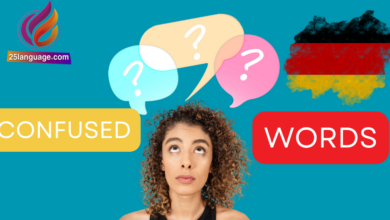Email Writing in German
Best Guide to Formal Email Writing in German
Email Writing in German is an important writing skill which one should acquire. Nowadays, sending emails is an essential part of professional life. If you are planning to work in Germany, you must know how to write emails.
Below is a guide to make email writing in German easy for you. You will learn about opening salutations, conclusions and more.
Format For Email Writing in German

How to Write a Formal Email in German
Salutation Segment – When to use these salutations in German formal email writing scenarios
Salutation translates to “die Anrede” in German. A salutation is a greeting used in an email.
Sehr geehrte Damen und Herren
This salutation is used when you barely know the individuals you are writing to. It means Dear Sir or/and Madam. When you have no idea who you are writing to, you can use this salutation.
Sehr geehrter Herr Schmidt
In a formal situation, when you know the name of the male individual you are writing to, you can use this salutation. Notice how we use geehrter here because of the German cases.
Sehr geehrte Frau Schmidt
In a formal situation, when you know the name of the female individual you are writing to, you can use this salutation. Notice how we use geehrte here because of the German cases.
Sehr geehrte Herren
When you want to write to two male persons but don’t know their names, you can use this salutation.
Sehr geehrte Damen
When you want to write to two female persons but don’t know their names, you can use this salutation.
Sehr geehrter Herr Professor Schmidt
In this case, you are writing a formal email to your professor, Mr. Schmidt. In such cases you can also mention the profession in the salutation.
Sehr geehrte Frau Doktor
Another case of writing the profession as a part of the salutation is this one. If you are writing to your doctor, you can use this salutation.
Werte Geschäftspartner
This translates to “Dear valued business partners”. If you are writing to your business partners, you can use this salutation.
Sehr geehrte Frau Kollegin
To write to your female colleague, you can use this salutation.
Sehr geehrter Herr Kollege
To write to your male colleague, you can use this salutation.
Text Segment – Formal Email Writing in German
Always start the opening word of the text segment in lower case
This is not really a tip, but a note. Do not capitalize the first letter of the first sentence. For instance- “ich schreibe … ” and not “Ich schreibe … “. The reason is that our sentence actually starts with “Sehr geehrte Damen und Herren,”. Post the comma, we should start the words with small letters and not capital letters. Hence we use ich, but not Ich.
Use the “Sie” form
Depending on the context of the email, use the appropriate formal language. Like we explained in “100+ Important Business German Words, Phrases and Sentences”, use the formal “Sie” form and not the “du” form of pronouns while writing. Sie (Ihr, Ihnen, Ihre)
Use K2
Use the “Konjunktiv II” or the “K2” form as needed. It makes the sentence even more polite.
English: Please try the following.
German without K2: Probieren Sie Folgendes.
German with K2: Wäre es möglich, dass Sie Folgendes probieren?
Closing and Signature Segment – How to End Formal German E-mail
Mit freundlichen Grüßen
This means ‘sincerely yours or sincere regards’. People also use MfG as a short form these days. This is one of the most frequently used closing lines.
If you are writing to your colleagues, you can use the short-form “MFG” or “MfG’.
Beste Grüße
The meaning of this closing line is ‘best regards’.
Mit herzlichen Grüßen
The meaning of this closing line is ‘with kind regards’.
common phrases for writing Emails
| German | English |
| Vielen Dank für Ihre schnelle Antwort. | Thank you for your quick answer. |
| Für weitere Fragen und Klärungen stehe ich Ihnen gerne zur Verfügung. | For further questions and clarifications, please do not hesitate to contact us. |
| Ich hoffe, bald von Ihnen zu hören. | Looking forward to hearing from you soon. |
| Im Voraus vielen Dank für Ihre Mühe. | Thank you in advance for your effort. |
| Ich wäre Ihnen sehr dankbar, wenn Sie mir bald antworten würden. | I would be very thankful if you would answer me soon. |
| Es tut mir leid. | I am sorry. |
| Wir freuen uns auf Ihre Antwort. | We look forward to your reply. |
| Ich bedanke mich im Voraus! | Thank you in advance. |
| Ich bitte um Verständnis. | Please bear with me. |
| Ich schreibe Ihnen, weil___ | I am writing to you because___ |
| Ich würde mich freuen, bald wieder von Ihnen zu hören. | I look forward to hearing from you soon. |
This was all about formal email writing in German.




























